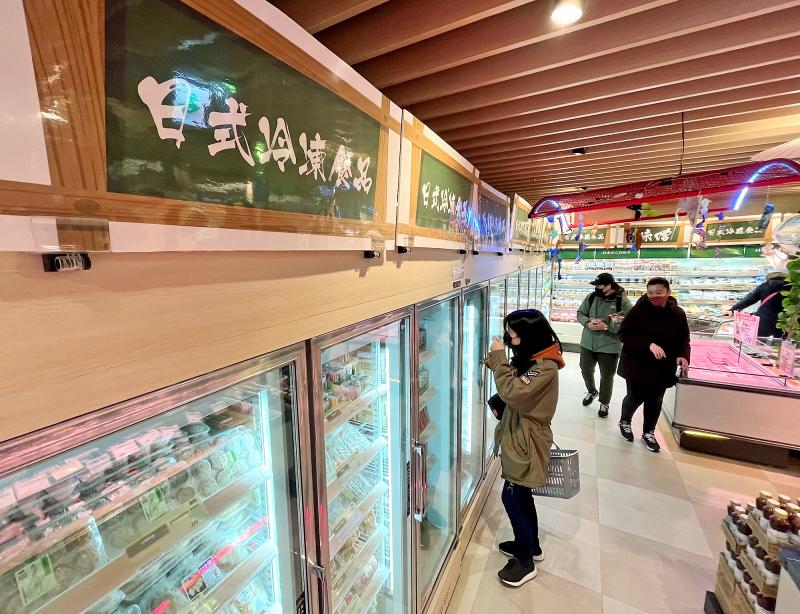The Food and Drug Administration (FDA) yesterday announced that food products from five Japanese prefectures that were banned after the Fukushima Dai-ichi nuclear power plant disaster in 2011 can now be imported to Taiwan, effective yesterday.
The Ministry of Health and Welfare on Feb. 8 promulgated draft measures for “types of food, and their production or manufacturing areas in Japan where imports are suspended,” saying that “designated foods imported from Japan shall be accompanied with a certificate of radioactive examination results for import inspection,” before opening a period of public comment.
“The proposals take effect immediately,” the FDA said.

Photo: CNA
The measures prohibit the importation of certain products, instead of banning all products from specific regions; require importers of high-risk food products to submit a certificate of origin and a certificate of radiation inspection; and require that food products from the five prefectures be inspected batch by batch.
About 17,000 imported food items are inspected for radioactive contamination each year, and an estimated 8,000 additional items would need to be inspected after the ban is lifted, Minister of Health and Welfare Chen Shih-chung (陳時中) said.
Taiwan has the capacity to conduct radioactive contamination inspections on up to 69,000 imported food items per year, so consumers need not worry, Chen said.
Food labels would indicate products imported from the five prefectures and inspection certificates would be included for certain food products, he said.
Asked whether 10 days were too short for public comment, Chen said that a referendum was held on the issue in 2018 and millions of people cast their votes, so it is not a new issue.
An adequate number of public comments was collected, he added.
The online Public Policy Participation Network Platform gathered 36 public comments: 17 in support of the policy, four against, and 15 that offered suggestions or inquired about the policy, he said.
The policy is based on scientific evidence and international food safety standards, Chen said, adding that public health would be safeguarded.
Asked when the first batch of food products from the five prefectures might arrive, Chen said he did not know any details, but had heard that some companies planned to import the products.

INVESTIGATION: The case is the latest instance of a DPP figure being implicated in an espionage network accused of allegedly leaking information to Chinese intelligence Democratic Progressive Party (DPP) member Ho Jen-chieh (何仁傑) was detained and held incommunicado yesterday on suspicion of spying for China during his tenure as assistant to then-minister of foreign affairs Joseph Wu (吳釗燮). The Taipei District Prosecutors’ Office said Ho was implicated during its investigation into alleged spying activities by former Presidential Office consultant Wu Shang-yu (吳尚雨). Prosecutors said there is reason to believe Ho breached the National Security Act (國家安全法) by leaking classified Ministry of Foreign Affairs information to Chinese intelligence. Following interrogation, prosecutors petitioned the Taipei District Court to detain Ho, citing concerns over potential collusion or tampering of evidence. The

NEGOTIATIONS: Taiwan has good relations with Washington and the outlook for the negotiations looks promising, Minister of Economic Affairs J.W. Kuo said Taiwan’s GDP growth this year is expected to decrease by 0.43 to 1.61 percentage points due to the effects of US tariffs, National Development Council (NDC) Minister Paul Liu (劉鏡清) said at a meeting of the legislature’s Economics Committee in Taipei yesterday, citing a preliminary estimate by a private research institution. Taiwan’s economy would be significantly affected by the 32 percent “reciprocal” tariffs slapped by the US, which took effect yesterday, Liu said, adding that GDP growth could fall below 3 percent and potentially even dip below 2 percent to 1.53 percent this year. The council has commissioned another institution

TRADE: The premier pledged safeguards on ‘Made in Taiwan’ labeling, anti-dumping measures and stricter export controls to strengthen its position in trade talks Products labeled “made in Taiwan” must be genuinely made in Taiwan, Premier Cho Jung-tai (卓榮泰) said yesterday, vowing to enforce strict safeguards against “origin laundering” and initiate anti-dumping investigations to prevent China dumping its products in Taiwan. Cho made the remarks in a discussion session with representatives from industries in Kaohsiung. In response to the US government’s recent announcement of “reciprocal” tariffs on its trading partners, President William Lai (賴清德) and Cho last week began a series of consultations with industry leaders nationwide to gather feedback and address concerns. Taiwanese and US officials held a videoconference on Friday evening to discuss the

NEGOTIATIONS: The US response to the countermeasures and plans Taiwan presented has been positive, including boosting procurement and investment, the president said Taiwan is included in the first group for trade negotiations with the US, President William Lai (賴清德) said yesterday, as he seeks to shield Taiwanese exporters from a 32 percent tariff. In Washington, US Trade Representative Jamieson Greer said in an interview on Fox News on Thursday that he would speak to his Taiwanese and Israeli counterparts yesterday about tariffs after holding a long discussion with the Vietnamese earlier. US President Donald Trump on Wednesday postponed punishing levies on multiple trade partners, including Taiwan, for three months after trillions of US dollars were wiped off global markets. He has maintained a 10 percent